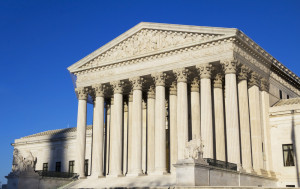New York Statewide Coalition of Hispanic Chambers of Commerce v. New York City Dep’t of Health & Mental Hygiene, New York COA, (6/26/14)
 In 2012, in an effort to combat obesity among residents of New York City, the New York City Board of Health amended the City Health Code so as to restrict the size of cups and containers used by food service establishments for the provision of sugary drinks. The proposed rule, referred to as the “Portion Cap Rule,” was to go into effect in 2013. Six not-for-profit and labor organizations challenged the Portion Cap Rule. Supreme Court, New York City declared the rule invalid and permanently enjoined its implementation. The Appellate Division affirmed. The Court of Appeals affirmed, holding that, in adopting the Portion Cap Rule, the Board of Health exceeded its regulatory authority and engaged in law-making, thereby infringing upon legislative jurisdiction.
In 2012, in an effort to combat obesity among residents of New York City, the New York City Board of Health amended the City Health Code so as to restrict the size of cups and containers used by food service establishments for the provision of sugary drinks. The proposed rule, referred to as the “Portion Cap Rule,” was to go into effect in 2013. Six not-for-profit and labor organizations challenged the Portion Cap Rule. Supreme Court, New York City declared the rule invalid and permanently enjoined its implementation. The Appellate Division affirmed. The Court of Appeals affirmed, holding that, in adopting the Portion Cap Rule, the Board of Health exceeded its regulatory authority and engaged in law-making, thereby infringing upon legislative jurisdiction.
Read More: Top state court says NYC can’t ban businesses from selling supersize sugary drinks to customers
McCullen v. Coakley, US Supreme Court (6/26/14)
Massachusetts amended its Reproductive Health Care Facilities Act to make it a crime to knowingly stand on a “public way or sidewalk” within 35 feet of an entrance or driveway to any “reproductive health care facility,” defined as “a place, other than within or upon the grounds of a hospital, where abortions are offered or performed.” Mass. Gen. Laws, 266, 120E½. Exemptions cover “employees or agents of such facility acting within the scope of their employment.” Another provision proscribes knowing obstruction of access to an abortion clinic. Abortion opponents who engage in “sidewalk counseling” sought an injunction, claiming that the amendment displaced them from their previous positions and hampered their counseling efforts; attempts to communicate with patients are also thwarted by clinic escorts, who accompany patients to clinic entrances. The district court denied the challenges. The First Circuit affirmed. The Supreme Court reversed, first noting the involvement of a traditional public forum. The Court employed “time, place, and manner” analysis, stating that the Act is neither content nor viewpoint based and need not be analyzed under strict scrutiny. Although it establishes buffer zones only at abortion clinics, violations depend not “on what they say,” but on where they say it. The Act is justified without reference to the content of speech; its purposes include protecting public safety, patient access to health care, and unobstructed use of public sidewalks and streets. There was a record of crowding, obstruction, and even violence outside Massachusetts abortion clinics but not at other facilities. The exemption for employees and agents acting within the scope of their employment was not an attempt to favor one viewpoint. Even if some escorts have expressed views on abortion inside the zones, there was no evidence that such speech was authorized by any clinic. The Act, however, burdens substantially more speech than necessary to further the government’s legitimate interests. It deprives objectors of their primary methods of communicating with patients: close, personal conversations and distribution of literature. While the Act allows “protest” outside buffer zones, these objectors are not protestors; they seek to engage in personal, caring, consensual conversations with women about alternatives. Another section of the Act already prohibits deliberate obstruction of clinic entrances. Massachusetts could also enact legislation similar to the Freedom of Access to Clinic Entrances Act, 18 U.S.C. 248(a), which imposes sanctions for obstructing, intimidating, or interfering with persons obtaining or providing reproductive health services. Obstruction of driveways can be addressed by traffic ordinances. Crowding was a problem only at the Boston clinic, and only on Saturday mornings; the police are capable of ordering people to temporarily disperse and of singling out lawbreakers.
Read More: Court strikes down abortion clinic buffer zones
 The issue this case presented for the Supreme Court’s review centered on the termination Respondent-appellant Billy McCall’s (Father) parental rights to K.P.M.A. (Child). Child was born out-of-wedlock to T.Z. (Mother) in 2012. Prospective adoptive parents, petitioners-appellees Marshall and Toni Michelle Andrews had had physical custody of the child since she was released from the hospital after birth. On appeal of his termination, father argued: (1) whether his due process rights were violated; (2) whether he received ineffective assistance of counsel during the termination proceedings; and (3) whether the trial court’s determination was supported by clear and convincing evidence. After review of the trial court record, the Supreme Court concluded that termination of the natural father’s parental rights was improper because the natural father’s due process rights were violated, and the termination of the natural father’s parental rights was not supported by clear and convincing evidence.
The issue this case presented for the Supreme Court’s review centered on the termination Respondent-appellant Billy McCall’s (Father) parental rights to K.P.M.A. (Child). Child was born out-of-wedlock to T.Z. (Mother) in 2012. Prospective adoptive parents, petitioners-appellees Marshall and Toni Michelle Andrews had had physical custody of the child since she was released from the hospital after birth. On appeal of his termination, father argued: (1) whether his due process rights were violated; (2) whether he received ineffective assistance of counsel during the termination proceedings; and (3) whether the trial court’s determination was supported by clear and convincing evidence. After review of the trial court record, the Supreme Court concluded that termination of the natural father’s parental rights was improper because the natural father’s due process rights were violated, and the termination of the natural father’s parental rights was not supported by clear and convincing evidence.
 Plaintiff was an abusive litigant. In this case, Plaintiff filed a complaint against Defendant, which the trial court dismissed for failure to prosecute or comply with applicable rules under Ind. Trial Rule 41(E). The court of appeals dismissed Plaintiff’s appeal with prejudice for Plaintiff’s failure to file a timely brief and appendix. The Supreme Court denied Plaintiff’s petition to transfer jurisdiction and refrained from imposing sanctions or restrictions. This per curiam opinion also gave guidance to the state’s courts on options when confronted with abusive and vexatious litigation practices.
Plaintiff was an abusive litigant. In this case, Plaintiff filed a complaint against Defendant, which the trial court dismissed for failure to prosecute or comply with applicable rules under Ind. Trial Rule 41(E). The court of appeals dismissed Plaintiff’s appeal with prejudice for Plaintiff’s failure to file a timely brief and appendix. The Supreme Court denied Plaintiff’s petition to transfer jurisdiction and refrained from imposing sanctions or restrictions. This per curiam opinion also gave guidance to the state’s courts on options when confronted with abusive and vexatious litigation practices. Plaintiffs, small business owners, filed a class action suit alleging that Yelp, an online forum, extorted or attempted to extort advertising payments from them by manipulating user reviews and penning negative reviews of their businesses. Plaintiffs filed suit against Yelp for violations of California’s Unfair Competition Law (UCL), Cal. Bus. & Prof. Code 17200 et seq.; civil extortion; and attempted civil extortion. The district court dismissed the suit for failure to state a claim. The court concluded that Yelp’s manipulation of user reviews, assuming it occurred, was not wrongful use of economic fear, and that the business owners pled insufficient facts to make out a plausible claim that Yelp authored negative reviews of their businesses. Therefore, the court agreed with the district court that these allegations did not support a claim for extortion. The court held that, to state a claim of economic extortion under both federal and California law, a litigant must demonstrate either that he had a pre-existing right to be free from the threatened harm, or that the defendant had no right to seek payment for the service offered. Given these stringent standards, plaintiffs failed to sufficiently allege that Yelp wrongfully threatened economic loss by manipulating user reviews. None of the business owners have stated a claim of “unlawful” conduct on the basis of extortion. Therefore, the court dismissed the separate claims of civil extortion and attempted civil extortion. Further, plaintiffs’ UCL claim failed under the “unfair” practices prong. Accordingly, the court affirmed the judgment of the district court.
Plaintiffs, small business owners, filed a class action suit alleging that Yelp, an online forum, extorted or attempted to extort advertising payments from them by manipulating user reviews and penning negative reviews of their businesses. Plaintiffs filed suit against Yelp for violations of California’s Unfair Competition Law (UCL), Cal. Bus. & Prof. Code 17200 et seq.; civil extortion; and attempted civil extortion. The district court dismissed the suit for failure to state a claim. The court concluded that Yelp’s manipulation of user reviews, assuming it occurred, was not wrongful use of economic fear, and that the business owners pled insufficient facts to make out a plausible claim that Yelp authored negative reviews of their businesses. Therefore, the court agreed with the district court that these allegations did not support a claim for extortion. The court held that, to state a claim of economic extortion under both federal and California law, a litigant must demonstrate either that he had a pre-existing right to be free from the threatened harm, or that the defendant had no right to seek payment for the service offered. Given these stringent standards, plaintiffs failed to sufficiently allege that Yelp wrongfully threatened economic loss by manipulating user reviews. None of the business owners have stated a claim of “unlawful” conduct on the basis of extortion. Therefore, the court dismissed the separate claims of civil extortion and attempted civil extortion. Further, plaintiffs’ UCL claim failed under the “unfair” practices prong. Accordingly, the court affirmed the judgment of the district court. The Fraternal Order of Police (FOP), an incorporated collective bargaining organization that represents the approximately 6,600 active police officers employed by the Philadelphia, operates a political action committee, COPPAC, for purposes of distributing contributions to candidates for local and state office. FOP, COPPAC, and four police officers challenged the constitutionality of section 10-107(3) of the Philadelphia Home Rule Charter, which prohibits employees of the Philadelphia Police Department from making contributions “for any political purpose,” 351 Pa. Code 10.10-107(3). The provision was enacted in 1951, based on Philadelphia’s history of political patronage. As interpreted by its implementing regulation, employees of the police department cannot donate to COPPAC because it uses some of its funds for partisan political purposes. The Charter ban applies only to the police, and does not proscribe political donations made by Philadelphia’s other 20,000 employees, the vast majority of whom are organized interests. The Third Circuit reversed summary judgment upholding the ban. Despite its valid concerns, the city did not explain how the ban serves in a direct and material way to address these harms. Given the lack of fit between the stated objectives and the means selected to achieve it, the Charter ban is unconstitutional.
The Fraternal Order of Police (FOP), an incorporated collective bargaining organization that represents the approximately 6,600 active police officers employed by the Philadelphia, operates a political action committee, COPPAC, for purposes of distributing contributions to candidates for local and state office. FOP, COPPAC, and four police officers challenged the constitutionality of section 10-107(3) of the Philadelphia Home Rule Charter, which prohibits employees of the Philadelphia Police Department from making contributions “for any political purpose,” 351 Pa. Code 10.10-107(3). The provision was enacted in 1951, based on Philadelphia’s history of political patronage. As interpreted by its implementing regulation, employees of the police department cannot donate to COPPAC because it uses some of its funds for partisan political purposes. The Charter ban applies only to the police, and does not proscribe political donations made by Philadelphia’s other 20,000 employees, the vast majority of whom are organized interests. The Third Circuit reversed summary judgment upholding the ban. Despite its valid concerns, the city did not explain how the ban serves in a direct and material way to address these harms. Given the lack of fit between the stated objectives and the means selected to achieve it, the Charter ban is unconstitutional. Plaintiffs filed suit challenging Virginia Code sections 20-45.2 and 20-45.3; the Marshall/Newman Amendment, Va. Const. art. I, 15-A; and any other Virginia law that bars same sex-marriage or prohibits the State’s recognition of otherwise-lawful same-sex marriages from other jurisdictions (collectively, the Virginia Marriage Laws). Plaintiffs argued that these laws violate the Due Process and Equal Protection Clauses of the Fourteenth Amendment. The district court granted plaintiffs’ motion for summary judgment and enjoined Virginia from enforcing the laws. As a preliminary matter, the court concluded that each of the plaintiffs had standing as to at least one defendant, and the court declined to view Baker v. Nelson as binding precedent. The court concluded that strict scrutiny analysis applied in this case where the Virginia Marriage Laws impede the right to marry by preventing same-sex couples from marrying and nullifying the legal import of their out-of-state marriages. Proponents contend that five interests support the laws: federalism-based interests, history and tradition, protecting the institution of marriage, encouraging responsible procreation, and promoting the optimal childrearing environment. The court concluded, however, that these interests are not compelling interests that justify the Virginia Marriage Laws. Therefore, all of the proponents’ justifications for the laws fail and the laws cannot survive strict scrutiny. Accordingly, the court concluded that the Virginia Marriage Laws violate the Due Process and Equal Protection Clauses of the Fourteenth Amendment to the extent that they prevent same-sex couples from marrying and prohibit Virginia from recognizing same-sex couples’ lawful out-of-state marriages. The court affirmed the judgment of the district court.
Plaintiffs filed suit challenging Virginia Code sections 20-45.2 and 20-45.3; the Marshall/Newman Amendment, Va. Const. art. I, 15-A; and any other Virginia law that bars same sex-marriage or prohibits the State’s recognition of otherwise-lawful same-sex marriages from other jurisdictions (collectively, the Virginia Marriage Laws). Plaintiffs argued that these laws violate the Due Process and Equal Protection Clauses of the Fourteenth Amendment. The district court granted plaintiffs’ motion for summary judgment and enjoined Virginia from enforcing the laws. As a preliminary matter, the court concluded that each of the plaintiffs had standing as to at least one defendant, and the court declined to view Baker v. Nelson as binding precedent. The court concluded that strict scrutiny analysis applied in this case where the Virginia Marriage Laws impede the right to marry by preventing same-sex couples from marrying and nullifying the legal import of their out-of-state marriages. Proponents contend that five interests support the laws: federalism-based interests, history and tradition, protecting the institution of marriage, encouraging responsible procreation, and promoting the optimal childrearing environment. The court concluded, however, that these interests are not compelling interests that justify the Virginia Marriage Laws. Therefore, all of the proponents’ justifications for the laws fail and the laws cannot survive strict scrutiny. Accordingly, the court concluded that the Virginia Marriage Laws violate the Due Process and Equal Protection Clauses of the Fourteenth Amendment to the extent that they prevent same-sex couples from marrying and prohibit Virginia from recognizing same-sex couples’ lawful out-of-state marriages. The court affirmed the judgment of the district court. King v. Burwell
King v. Burwell This week, a federal judge in the U.S. District Court for the Central District of California issued a
This week, a federal judge in the U.S. District Court for the Central District of California issued a  Last month, the Court of Justice of the European Union issued a preliminary ruling on
Last month, the Court of Justice of the European Union issued a preliminary ruling on  Today, the U.S. Supreme Court handed down its
Today, the U.S. Supreme Court handed down its  In 2012, in an effort to combat obesity among residents of New York City, the New York City Board of Health amended the City Health Code so as to restrict the size of cups and containers used by food service establishments for the provision of sugary drinks. The proposed rule, referred to as the “Portion Cap Rule,” was to go into effect in 2013. Six not-for-profit and labor organizations challenged the Portion Cap Rule. Supreme Court, New York City declared the rule invalid and permanently enjoined its implementation. The Appellate Division affirmed. The Court of Appeals affirmed, holding that, in adopting the Portion Cap Rule, the Board of Health exceeded its regulatory authority and engaged in law-making, thereby infringing upon legislative jurisdiction.
In 2012, in an effort to combat obesity among residents of New York City, the New York City Board of Health amended the City Health Code so as to restrict the size of cups and containers used by food service establishments for the provision of sugary drinks. The proposed rule, referred to as the “Portion Cap Rule,” was to go into effect in 2013. Six not-for-profit and labor organizations challenged the Portion Cap Rule. Supreme Court, New York City declared the rule invalid and permanently enjoined its implementation. The Appellate Division affirmed. The Court of Appeals affirmed, holding that, in adopting the Portion Cap Rule, the Board of Health exceeded its regulatory authority and engaged in law-making, thereby infringing upon legislative jurisdiction.